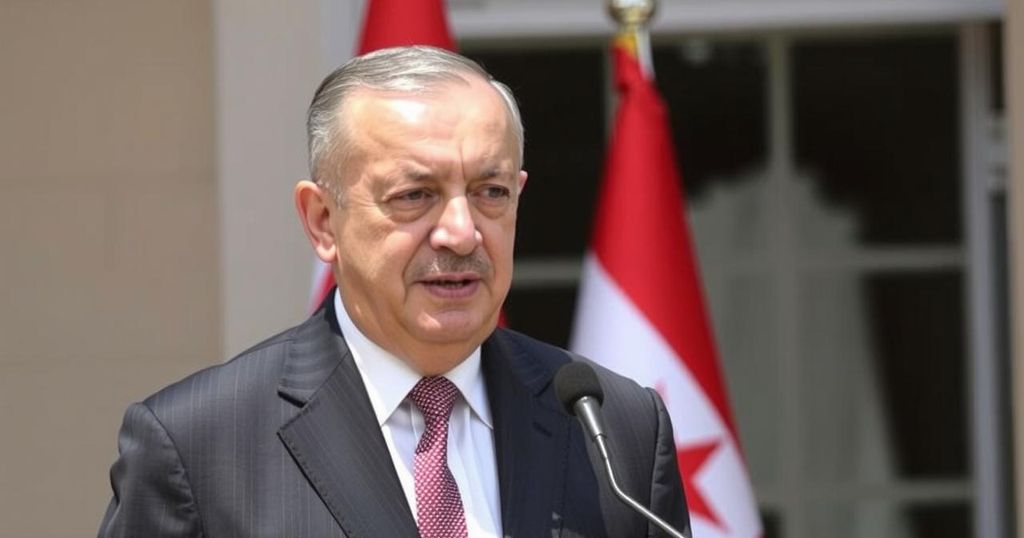President Erdogan of Turkey will visit Cairo on December 19 to meet with Egyptian President el-Sisi, focusing on developments in Syria after the Assad government’s collapse. The visit, part of the D-8 summit, signifies an effort to strengthen Turkey-Egypt relations in light of regional changes and aims to address concerns regarding the governance of Syria by factions like HTS.
President Recep Tayyip Erdogan of Turkey is scheduled to visit Cairo to engage in discussions with Egyptian President Abdel Fattah el-Sisi, with a particular emphasis on Syria. This meeting will coincide with the D-8 summit taking place on December 19. Erdogan’s visit, initially planned before the recent upheaval in Syria, reflects Egypt’s effort to establish strategic dialogue with Turkey regarding the emerging government in Syria following the ousting of Bashar al-Assad. Amidst growing regional diplomacy, Erdogan’s influence in Syria is significant, particularly following the rise of Turkish-backed factions and their growing role in Syrian governance.
The backdrop of this diplomatic engagement includes a notable shift in regional alliances. Erdogan, who has long supported the Syrian opposition, finds himself in a position to play a critical role in shaping post-Assad Syria. His visit seeks not only to address security concerns regarding former al-Qaeda affiliate Hay’at Tahrir al-Sham (HTS) but also to explore possibilities for rebuilding Syrian infrastructure, which is estimated to require substantial investment.
As the meeting unfolds, Erdogan’s influence on the ground is underscored by recent interactions between Turkish intelligence and Syrian groups. While this engagement with HTS raises alarms among regional powers regarding potential governance issues in Syria, Egyptian leaders are focused on fostering stability and containing the security implications of this transition. Moreover, Erdogan’s desire for the return of Syrian refugees resonates with Sisi’s goal of regional stability.
This diplomatic visit marks a turning point in Turkey-Egypt relations, previously strained over conflicting interests in the region. The potential for reconciliation between the two leaders could reshape their respective roles in the changing Middle Eastern landscape. As Sisi aims to mediate broader discussions involving Iran, the outcomes of this meeting will be pivotal in determining the future dynamics within Syria and beyond, particularly in terms of partnerships between Arab states and Turkey amidst historical rivalries.
The context surrounding Turkish President Erdogan’s visit to Cairo is characterized by shifting alliances in the Middle East following the recent collapse of the Assad government in Syria. The ousting of the Assad regime has opened a pathway for Erdogan to expand Turkey’s influence in Syrian politics, especially with various factions vying for power amid ongoing conflict. Simultaneously, Egypt’s strategic interest in maintaining regional stability amid the rise of groups like HTS indicates a need for direct dialogue with Turkey. Both leaders face the challenge of navigating complex geopolitical landscapes fueled by historical tensions and conflicting regional strategies, particularly in the wake of the Arab Spring. Furthermore, economic possibilities linked to Syria’s reconstruction and the return of Syrian refugees present additional layers of significance to this meeting.
In conclusion, President Erdogan’s forthcoming visit to Cairo represents a significant opportunity for dialogue between Turkey and Egypt regarding the post-Assad landscape in Syria. It underscores the changing dynamics in the region, where traditional rivalries may give way to partnership-building aimed at addressing shared security concerns and reconstruction efforts. The outcomes of this meeting will not only determinE bilateral relations but potentially influence broader regional stability, making it a focal point for observers of Middle Eastern politics.
Original Source: www.middleeasteye.net






